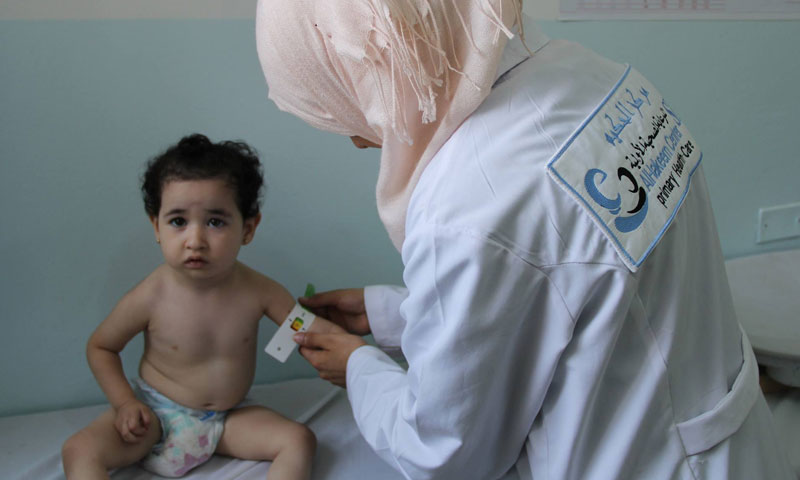For three years, the al-Hakeem Center continued to offer its cervices in the filed of first healthcare in Eastern Ghouta, targeting pregnant and breastfeeding women, as well as infants, despite the siege that the area suffered.
The al-Hakeem Pregnant Women and Infants Care Center with most of its medical staff have moved to Northern Syria, as a result of the displacement campaigns which targeted Damascus’ Eastern Ghouta following the regime’s control over it in April 2018. The Center declared resuming its activities in the city of Maarrat al-Nu’man, southern rural Idlib, offering its services to infants, pregnant and breastfeeding women.
Ismail al-Khatib, Director of al-Hakeem Center, told Enab Baladi that the Center includes different departments that offer their services to patients for free, on top of these is the department of children malnutrition, under two age classes; the first ranges from one day to six months and the second is from six to 59 months (five years).
Malnutrition is addressed within the community-based management program for acute malnutrition, as well as the provision of routine food and medication to patients.
The Center also includes a section for the care of pregnant women from the first month until birth and continues to provide care for them even after birth, in addition to treatment of children over the age of five years.
Al-Khatib pointed out that the number of beneficiaries of the Center’s services arrived at 5500 people per month, offered by the various activities and existing departments, as the Center does not only provide services to the children of the Eastern Ghouta who are displaced to Northern Syria, but it also benefits the area’s people.
Most of the al-Hakeem Center’s medical staff which worked in Eastern Ghouta moved to the new center in Maarrat al-Nu’man, except for a small number of workers, where the shortage was overcome according to al-Khatib.
Al-Khatib spoke of the great facilities, which are supporting the Center’s work in Maarrat al-Nu’man, as opposed to the Hamouriyah Center in Eastern Ghouta. Food and medical supplies are more available in Northern Syria, while Ghouta suffered from a suffocating five years siege, which led to widespread malnutrition among children.
Al-Hakeem Center also benefited from the freedom of movement available in Northern Syria, which is relatively stable in terms of security, in addition to the availability of basic materials to operate the center, including fuel.
Mobile Clinics and Awareness Activities
Al-Hakeem Center does not only provide primary health care services to mothers and children within the permanent center, for it organizes external campaigns through six mobile clinics.
The Center’s Director pointed out that these campaigns are concentrated mostly in the Northern Syria camps, in addition to a few residential compounds to offer the same services provided by the Center.
The Center also provides awareness campaigns to pregnant and lactating women, which are divided into two parts. The first is individual advice requested by the beneficiaries, often focused on promoting the culture of breastfeeding and the risks of artificial feeding and supplementary food, as well as the gradual methods of feeding children.
The second is a group consultation conducted in the presence of the target women in the waiting room or by inviting them to the Health Advisory Hall, where awareness issues are raised in general.
Al-Hakeem Center is supported by the Social Development International Foundation (SDI) and aims to actively reach out to a wider segment of the Syrian community.











